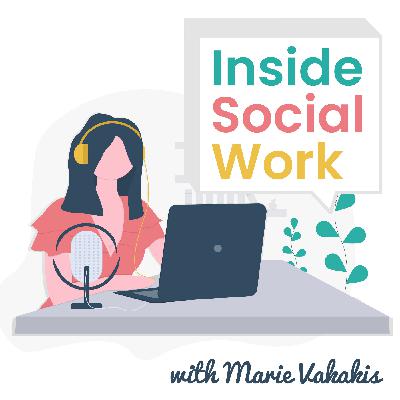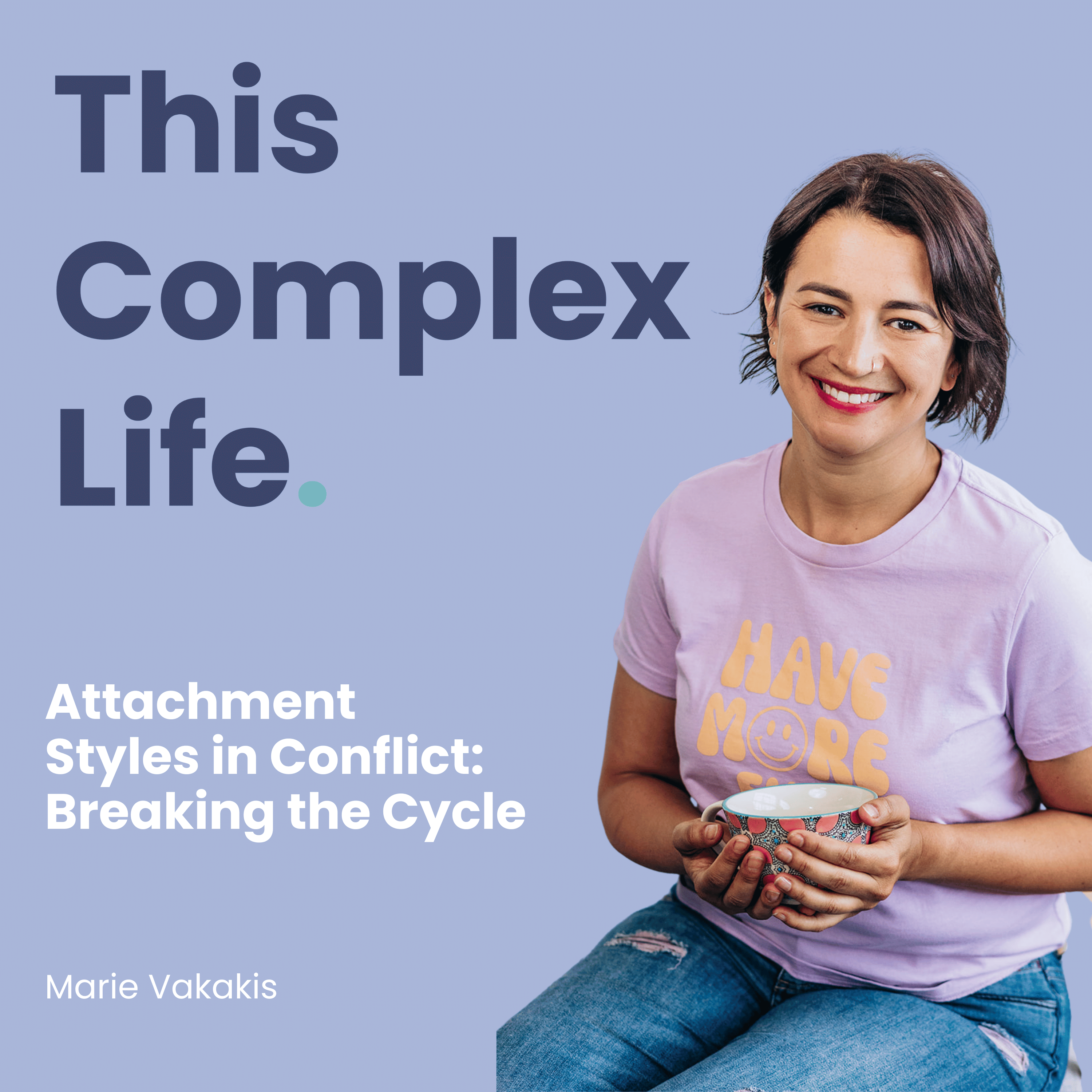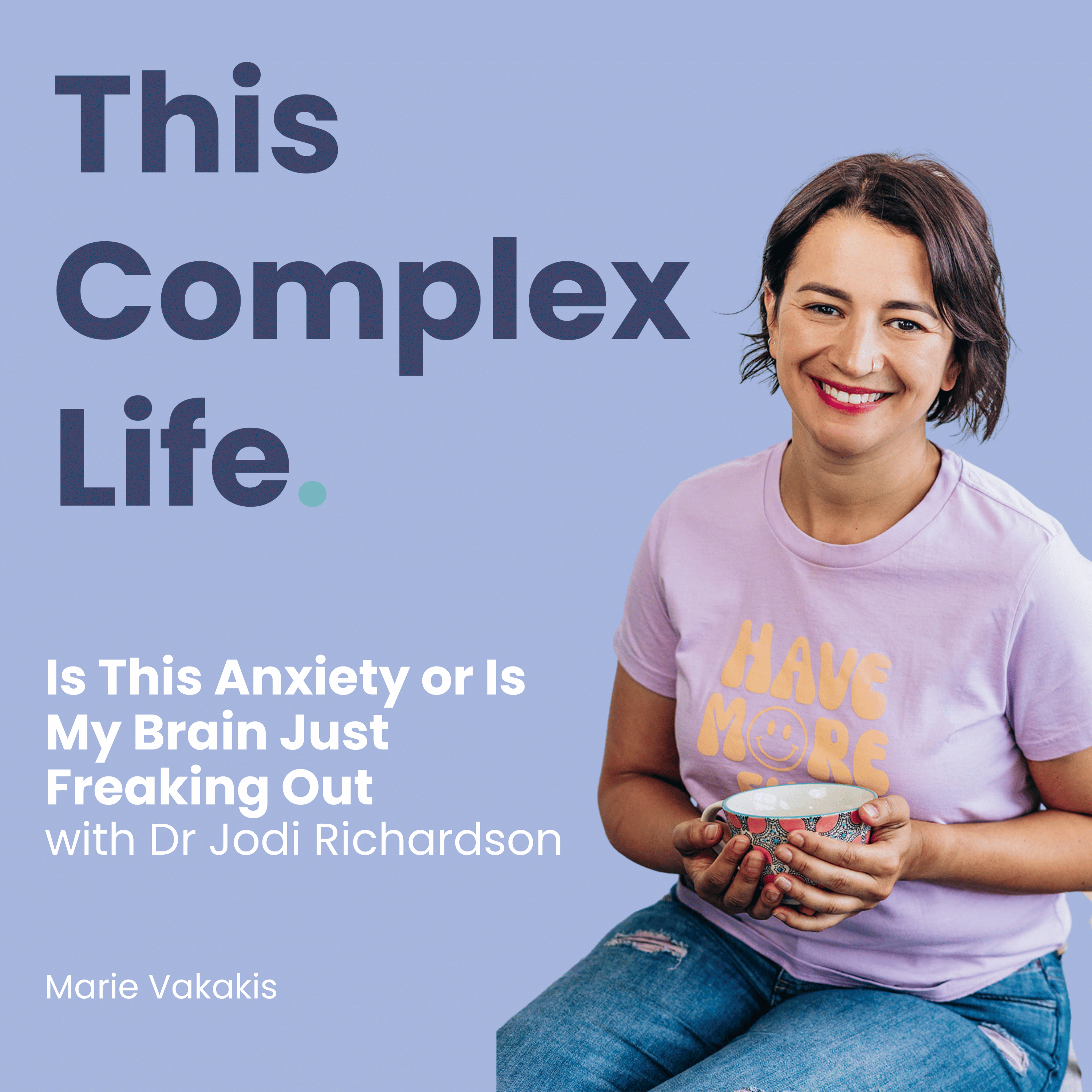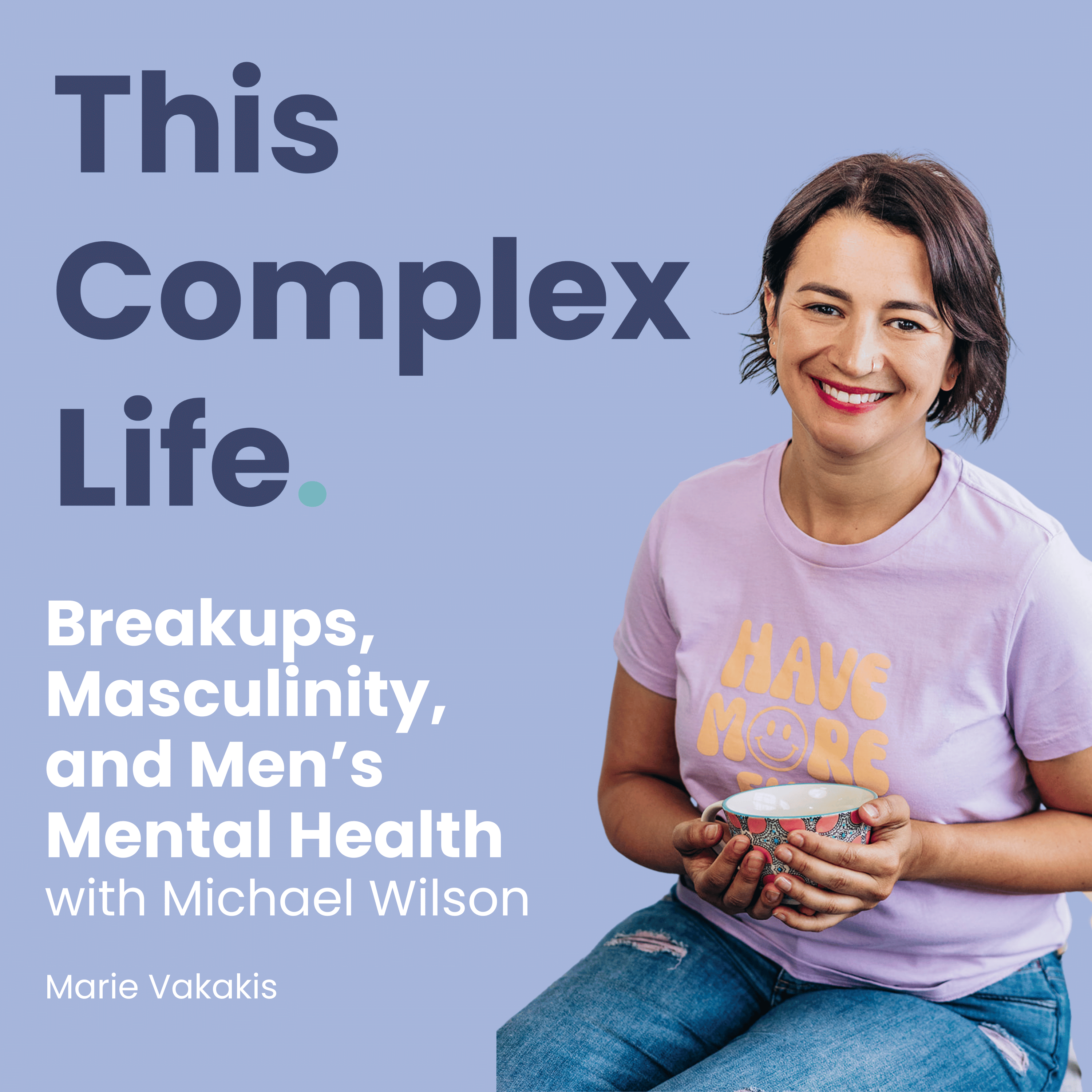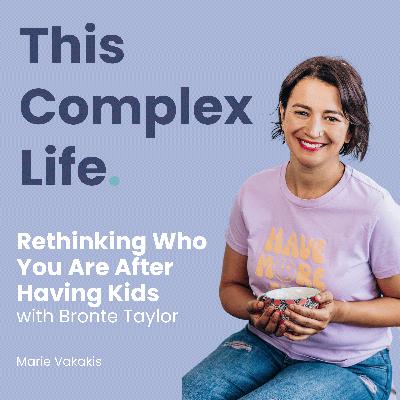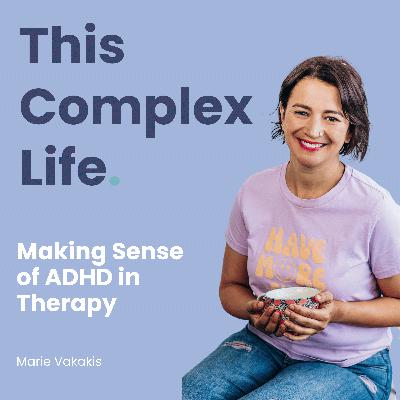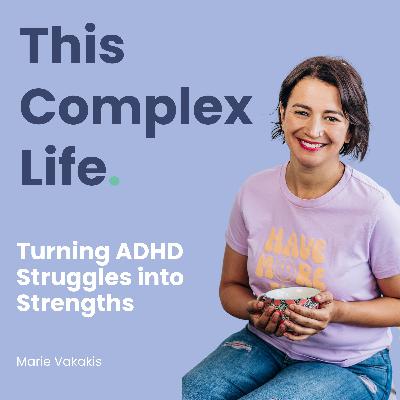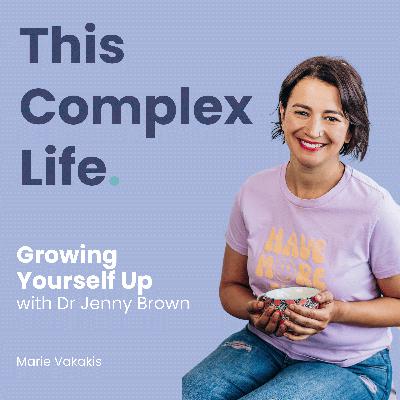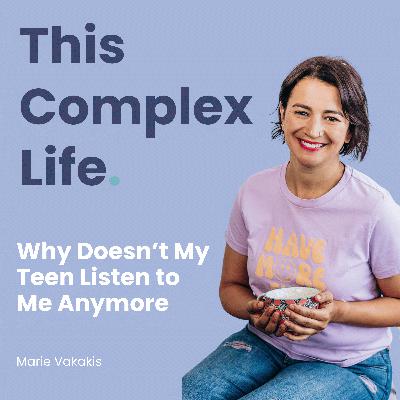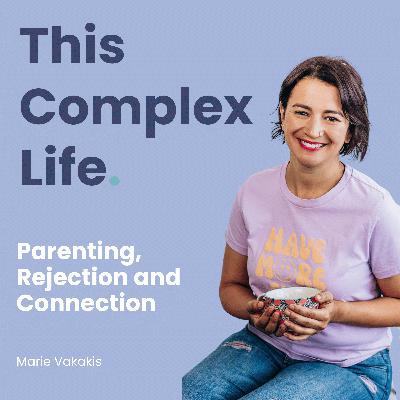Discover This Complex Life
This Complex Life

This Complex Life
Author: Marie Vakakis
Subscribed: 134Played: 2,032Subscribe
Share
© Copyright 2026 Marie Vakakis
Description
Got questions about parenting, teenagers, or relationships? Ever wonder why your teen won’t talk to you, or why your relationship feels like hard work lately? Hi, I’m Marie Vakakis—a therapist, mental health educator, and someone who’s been behind the scenes with countless families and couples navigating the ups and downs of real life.
This Complex Life is your go-to for relatable insights, practical advice, and real talk about parenting, raising teenagers, and navigating relationships. I’ll share what I’ve learned from years of sitting in the therapist’s chair—helping parents understand their teens, supporting couples through tough times, and figuring out what actually works when life feels overwhelming.
Whether it’s understanding your teen’s moods, handling family drama, or reconnecting in your relationship, I’m here to give you practical advice, relatable insights and a little humour to keep it real. Parenting and relationships aren’t easy, but they don’t have to feel impossible.
Subscribe to This Complex Life for honest advice and actionable tips to make life’s messiness more manageable.
This Complex Life is your go-to for relatable insights, practical advice, and real talk about parenting, raising teenagers, and navigating relationships. I’ll share what I’ve learned from years of sitting in the therapist’s chair—helping parents understand their teens, supporting couples through tough times, and figuring out what actually works when life feels overwhelming.
Whether it’s understanding your teen’s moods, handling family drama, or reconnecting in your relationship, I’m here to give you practical advice, relatable insights and a little humour to keep it real. Parenting and relationships aren’t easy, but they don’t have to feel impossible.
Subscribe to This Complex Life for honest advice and actionable tips to make life’s messiness more manageable.
175 Episodes
Reverse
In this week's episode, you’ll hear how Silvina started an inclusive drama program in Canada and ran it successfully there for a number of years before moving to Melbourne and starting it all over again. Learn more here https://www.purplecarrots.com.au/ Join the supervision group for school social workers and school counsellors https://thetherapyhub.com.au/supervision/ Become a Youth Mental Health First Aider Face to face in Footscray https://thetherapyhub.com.au/youth-mental-health-first-aid/ Online https://thetherapyhub.com.au/online-youth-mental-health-first-aid/ Inside Social Work Podcast: Website / Facebook/ Be on the Podcast/ Support the show Subscribe to the podcast wherever you get your podcasts!
Supervision is SO important . It provides a forum for reflection and learning, review, reflection, critique and replenishment for professional practitioners. One of the purposes of social work supervision is to enhance the professional skills and competence of the supervisee to achieve positive outcomes for the people with whom they work Choosing a supervisor It's crucial to find someone you can work with and trust Some things to ask or explore - check out their linkedin profile, website or other profiles What is their background and work experience? Do they have any areas of specialty and/or interest? Does this match the work your doing or are interested int? Ask them what is their approach to supervision? Check if they are Professional. Knowledgeable. You’re compatible Convenient / do they have the availability to mete your needs? Inside Social Work Podcast: Website / Facebook/ Be on the Podcast/ Support the show Subscribe to the podcast wherever you get your podcasts!
If you've ever wondered about the real reasons behind addiction or how to navigate social pressures around alcohol, this episode is for you. In this episode, I chat with Tara Herster, a psychologist specialising in addiction and substance use. Tara breaks down common myths about addiction and offers practical strategies for managing substance use, dealing with social pressures, and exploring sober dating. Her insights challenge the traditional views on addiction and provide a fresh perspective on coping mechanisms and building authentic connections without relying on substances.In This Episode, We Discuss:Understanding Addiction Beyond the MythsAddiction isn't about weakness or moral failure; it's often a coping mechanism.Tara's path from high school to addiction specialist.Addiction Isn't a DiseaseAddiction as a learned behaviour for dealing with stress.Tara's experiences in an inpatient psychiatric hospital.Practical Strategies for Managing Substance UseThe HALT method: Hungry, Angry, Lonely, Tired (plus Hydrated and Health).“Anytime we are engaging in something that we don’t necessarily want to do though we just find ourselves doing it in a mindless way it’s because of HALT.”Navigating Social Pressures Around AlcoholStrategies for handling social pressures.“I appreciate, I’m just not drinking today,” or “I’ve got antibiotics.”Sober Dating: Building Authentic ConnectionsTips for dating without alcohol.The FRIES acronym: Freely Given, Reversible, Informed, Enthusiastic, and Specific.“You attract what you put out,” and “Building connections without substances can lead to more authentic relationships.”The Sober Curious MovementExploring life without alcohol.The trend among younger generations.Quotes from the Episode:Tara Hurster:“Anytime we are engaging in something that we don’t necessarily want to do though we just find ourselves doing it in a mindless way it’s because of HALT.”“Addiction is not an illness. It's not a weakness. It's not a disease. It is something that people have learned how to most effectively and most efficiently solve the problem of their experience.”Resources Mentioned:Alcohol and Drug Information Service: 1800 250 015, ADIS WebsiteConnect with Tara Hurster:Website: Tara ClinicInstagram: @taraHursterIf you enjoyed this episode, please leave a review and share it with your friends. Don't forget to subscribe for more insightful conversations on This Complex Life.Get the full transcript here Submit a question to the Podcasthttps://forms.gle/nvNQyw9gJXMNnveY6 Connect with Marie https://thetherapyhub.com.au/ https://marievakakis.com.au/ https://www.instagram.com/marievakakis/Mentioned in this episode:Join me live Jan 28th for the Relationship New Year Reset
https://marievakakis.com.au/relationship-new-year-reset-2026/
This podcast episode will look a little different to future episodes. Its a chance for you to get to know the host Marie Vakakis and hear about her motivations for the podcast. The Inside Social Work podcast is a podcast interview series that aims to entertain and inspire Social workers illustrating the diverse world of social work through conversations with industry leaders, colleagues, peers, new graduates and mentors.
Have you ever had a reaction to your partner that felt huge?Like a ten out of ten response to something small?You are crying over coffee.They are confused.You are both thinking, what just happened?It makes sense that this feels confusing. Most couples are not fighting about the present moment. They are reacting from something older.In this episode, I explore how your wounded child shows up in adult relationships, why conflict can feel bigger than the situation and how attachment patterns keep couples stuck in the same loop.This is not about blame. It is about understanding the pattern.In this episode I cover:• Why small arguments turn into big emotional reactions• How childhood needs for safety, soothing and validation shape adult conflict• What anxious and avoidant attachment can look like in a fight• Why you get louder and they shut down• What secure conflict actually feels like• Practical steps to pause, name your needs and respond rather than reactYou are not broken for reacting strongly. There is nothing wrong with you for feeling that. Often, if it feels hysterical, it is historical.The goal is not to erase your wounds. The goal is to make sure they are not driving your adult intimacy. Resources:If you want more support, download the Conflict Guide and start noticing your patterns with compassion and clarity.https://marievakakis.com.au/why-couples-keep-arguing-and-what-its-really-aboutand-what-its-really-about/ENROL NOW Relationship New Year RESET 2026https://marievakakis.com.au/relationship-new-year-reset-2026/Connect with Mariehttps://thetherapyhub.com.au/https://marievakakis.com.au/https://www.instagram.com/marievakakis/Submit a question to the Podcasthttps://forms.gle/nvNQyw9gJXMNnveY6
If you keep having the same argument with your partner, it might not be about the topic at all. Often, it is not about the dishes, the plans for the weekend, or who forgot to call back. How you fight, well, that could be based on your attachment style. In this episode, I’ll explore how anxious and avoidant attachment styles show up during conflict and why they can create painful cycles that feel impossible to escape.I’ll share what I see as a couples therapist and what you can do about it. Conflict with a partner activates something deep in our nervous system. Suddenly, we are not calm, rational adults. We are reacting to old attachment wounds. One person escalates, the other withdraws, and before long, the original issue is forgotten while the emotional storm takes over.In this episode I’ll explain how these patterns form, why they make sense from an attachment perspective, and most importantly, how couples can begin to break the cycle.In this episode you will learn:• Why couples repeat the same arguments over and over• How anxious and avoidant attachment styles trigger each other• What happens in the nervous system during relationship conflict• Why silence can feel dangerous for one partner and safe for the other• The difference between taking a break and stonewalling• How to communicate needs clearly during heated moments• Practical scripts to help repair after conflict• Why repair is more important than getting it rightResources mentioned:Working with conflict course: https://marievakakis.com.au/working-with-conflict-in-couples-therapy/ Download guide: https://marievakakis.com.au/why-couples-keep-arguing-and-what-its-really-aboutand-what-its-really-about/ Couples therapy sessions at The Therapy HubIf this episode resonates, share it with your partner or a friend and start the conversation.ENROL NOW Relationship New Year RESET 2026https://marievakakis.com.au/relationship-new-year-reset-2026/Connect with Mariehttps://thetherapyhub.com.au/https://marievakakis.com.au/https://www.instagram.com/marievakakis/Submit a question to the Podcasthttps://forms.gle/nvNQyw9gJXMNnveY6
So many couples say the same thing when they come to therapy. We probably should have talked about this earlier. Not because of one big issue, but because of all the small conversations that got pushed aside.In this episode, I’m sharing five relationship topics that come up again and again in my therapy sessions. Things like how to talk about personal goals, navigating money and shared responsibilities, defining sex and intimacy, managing expectations as life changes, and naming the fears that quietly shape how we show up with each other.What we coverThe conversations couples often avoid that lead to disconnectionWhat to talk about before starting study or changing routinesWhy money triggers old patterns, and how to talk about them togetherHow to define sex and intimacy in a way that works for both of youExpectations around parenting, roles and who does whatHow fear shows up in silence, frustration or resentmentMentioned in this episodeRelationship Refresh Workshop (on demand)Sex and Intimacy Conversation Starter GuideTherapy sessions at The Therapy HubENROL NOW Relationship New Year RESET 2026https://marievakakis.com.au/relationship-new-year-reset-2026/Connect with Mariehttps://thetherapyhub.com.au/https://marievakakis.com.au/https://www.instagram.com/marievakakis/Submit a question to the Podcasthttps://forms.gle/nvNQyw9gJXMNnveY6
Sharing good news with your partner should feel connecting. Yet for many people, moments of success can quickly turn into hurt or tension when the response feels flat, awkward, or dismissive.In this episode, I respond to a listener question about getting a promotion and feeling unsupported by their partner. I unpack three common reasons this happens and what is often going on underneath the surface.This is not about someone being uncaring or selfish. It is about different emotional languages, family histories, and unspoken fears colliding in the same moment.What this episode exploresWhy celebrations matter differently to different peopleHow family culture shapes responses to successWhy promotions can trigger shame, fear, or disconnectionHow money and identity influence reactionsWhat to say when a moment goes wrong and how to slow the conversation downWhen good news turns into conflict, it is rarely about the achievement itself. It is about meaning, expectations, and what has not yet been said.ENROL NOW Relationship New Year RESET 2026https://marievakakis.com.au/relationship-new-year-reset-2026/Connect with Mariehttps://thetherapyhub.com.au/https://marievakakis.com.au/https://www.instagram.com/marievakakis/Submit a question to the Podcasthttps://forms.gle/nvNQyw9gJXMNnveY6 Mentioned in this episode:Join me live Jan 28th for the Relationship New Year Reset
https://marievakakis.com.au/relationship-new-year-reset-2026/
Why won’t my partner communicate with meIt’s one of the most common questions I hear in the therapy room and it’s usually coming from someone who feels shut out, unheard or like they’re carrying the emotional load on their own.In this episode of This Complex Life, I’ll share what’s often really going on when communication feels blocked, when you keep fighting or arguing. Because most of the time, it’s not about a lack of words. It’s about emotional safety, overwhelm and patterns that quietly shut conversations down.I talk about emotional flooding, the communication patterns that make things worse instead of better, and how the way conversations start can set them up to fail before they even begin. I also explore how what we learned about conflict growing up still shapes how we show up in our relationships today.You’ll also hear practical questions you can ask that invite reflection instead of defensiveness, and small shifts that can help you feel more connected without escalating into another fight.In this episode, we exploreWhy communication problems are rarely just about talkingEmotional flooding and shutdown and why it feels impossible to stay presentThe Gottman Four Horsemen and how they show up in everyday conversationsHow criticism, defensiveness and stonewalling block connectionWhy timing and tone matter more than being rightHow family of origin shapes your comfort with conflictQuestions that help you understand each other instead of escalatingIf you’ve ever thought we just don’t communicate anymore, this episode is for you.ENROL NOW Relationship New Year RESET 2026https://marievakakis.com.au/relationship-new-year-reset-2026/Connect with Mariehttps://thetherapyhub.com.au/https://marievakakis.com.au/https://www.instagram.com/marievakakis/Submit a question to the Podcasthttps://forms.gle/nvNQyw9gJXMNnveY6 Mentioned in this episode:Join me live Jan 28th for the Relationship New Year Reset
https://marievakakis.com.au/relationship-new-year-reset-2026/
Do you want to feel closer to your partner, but feel unsure how to bring it up?Many couples care deeply about each other and still drift apart. Life gets busy. Conversations become practical. Emotional connection fades quietly. Not because people stop trying, but because the harder conversations get avoided.In this episode, I talk about why relationships drift even when there is love and good intention. I explore why low conflict is often mistaken for connection, and why avoiding check ins can slowly create distance.I also share three simple questions I use with couples that help change the tone of conversations. These questions focus on understanding rather than blame and can be used straight away.If you are feeling disconnected and do not know where to start, this episode offers a calm and practical place to begin.In this episodeWhy couples drift without realising itWhy love alone is not enough to stay connectedHow avoidance shows up in well intentioned relationshipsThree questions that help couples check in and reconnectENROL NOW Relationship New Year RESET 2026https://marievakakis.com.au/relationship-new-year-reset-2026/Connect with Mariehttps://thetherapyhub.com.au/https://marievakakis.com.au/https://www.instagram.com/marievakakis/Submit a question to the Podcasthttps://forms.gle/nvNQyw9gJXMNnveY6 Mentioned in this episode:Join me live Jan 28th for the Relationship New Year Reset
https://marievakakis.com.au/relationship-new-year-reset-2026/
Have you ever found yourself thinking my partner is not the same person I fell in love with.Maybe you still care deeply but something feels off.Conversations go in circles.You keep fighting about the same thingsOr you feel lonely even though you are still together.This is a pattern I see often in my work as a couples therapist. Most couples want the same things. Connection. Safety. Feeling valued. Where they get stuck is in how they try to get there.In this episode of This Complex Life, I walk you through five common patterns that show up when couples feel disconnected over time. This is not about fixing your partner. It is about understanding what is actually happening underneath the surface when two people who care start missing each other.Feeling disconnected does not automatically mean you have outgrown each other or chosen the wrong person. Often it means the relationship has not been updated to match how life and people have changed.In this episode, I share the 5 common mistakes I see people make. • Why relationships can feel harder as life gets fuller• How unmet expectations quietly create distance• What happens when both people are trying but still missing each other• Why assuming they should just know leads to resentment• How criticism and contempt creep in without you noticingIf you are feeling stuck, confused, or wondering what happened to the closeness you once had, you are not alone in this. Some of this is uncomfortable and that is okay. Understanding the pattern is often the first step towards repair.Tired of going round in circles with your partner?Relationship Refresh is a practical couples program that helps you stop the blame game, communicate better and feel like a team again.👉 marievakakis.com.au/for-couplesIf things feel more stuck and you need deeper support, you can book an Intensive Couples Therapy session with me through The Therapy Hub👉 thetherapyhub.com.auStruggling to talk about sex, desire or intimacy without it getting weird or shutting down?Download my free guide How to talk about sex, desire and connection: https://mailchi.mp/marievakakis/a-guide-to-talking-about-sex-and-intimacyConnected Teens https://marievakakis.com.au/connected-teens/Connect with Marie https://thetherapyhub.com.au/ https://marievakakis.com.au/ https://www.instagram.com/marievakakis/Submit a question to the Podcasthttps://forms.gle/nvNQyw9gJXMNnveY6 Mentioned in this episode:Join me live Jan 28th for the Relationship New Year Reset
https://marievakakis.com.au/relationship-new-year-reset-2026/
Anxiety can feel confusing and overwhelming, especially when your brain reacts faster than you can make sense of it. In this episode, I talk with Dr Jodi Richardson about the difference between everyday stress, overwhelming worry and anxiety that needs more support.We explore why anxiety shows up in the body, why discomfort often feels unsafe and how childhood patterns can affect the way we manage emotions as adults. Jodi shares practical, compassionate ways to understand your anxiety and feel more grounded when your mind starts spiralling.In this episode we cover:• The difference between stress, overwhelm and anxiety• Why anxiety activates the stress response• How childhood emotional patterns shape anxiety• Why discomfort often feels dangerous• What helps when anxiety feels big• How to support someone with anxiety without fixing• When to seek professional helpYour brain is not broken. It is responding to something that feels uncertain or overwhelming, and you can support it in ways that actually work.Connect with Dr Jodi Richardson:https://drjodirichardson.com.au/ Resources:📕Daily StoicWell Hello Anxiety PodcastConnected Teens https://marievakakis.com.au/connected-teens/Connect with Marie https://thetherapyhub.com.au/ https://marievakakis.com.au/ https://www.instagram.com/marievakakis/Submit a question to the Podcasthttps://forms.gle/nvNQyw9gJXMNnveY6 Mentioned in this episode:Join me live Jan 28th for the Relationship New Year Reset
https://marievakakis.com.au/relationship-new-year-reset-2026/
Breakups can be hard on all of us, they can shake our sense of self in ways we don't expect. For men, the emotional impact is not something that's often spoken about. They’re taught to suck it up and get on with it. In this episode of This Complex Life, I sit down with Michael Wilson, a Research Fellow focused on men’s mental health and suicide prevention to talk about why men often struggle silently during breakups and how society’s ideas about masculinity shape the way they cope.We explore how shame, identity loss and isolation can build after a relationship ends, and why many men do not seek help until they reach a crisis point. There is another way to move through it. Understanding, connection and emotional honesty can help men rebuild their sense of self with more clarity and confidence.In this conversation, we talk about • Why breakups can shake men’s identity • How conditioning around masculinity affects emotional expression • The role shame plays in silence • What men wish they could say but feel they cannot • How to support men without jumping into solutions • Ways to rebuild confidence after a relationship endsIf you are working through a breakup or navigating a season of change, you do not have to do it alone.Connect with Michael Wilson: Linkedin: https://www.linkedin.com/in/michael-wilson-4b2090164/ Michael Wilson is a Research Fellow focused on men’s mental health and suicide prevention, based with Orygen at the University of Melbourne.Since 2018, Michael has published and presented research both nationally and internationally across a range of subjects, including healthy masculinities and mental health in young men, improving training for mental health practitioners around engaging and responding to help-seeking men, and understanding risk and protective factors associated with suicidal thoughts and behaviours in men.His research currently focuses on men's mental health and suicide risk in the context of intimate partner relationship breakdown.Resources: Main paper: https://psycnet.apa.org/fulltext/2026-40673-001.html Other research: https://scholar.google.com.au/citations?hl=en&user=avSkawsAAAAJ&view_op=list_works&authuser=1&sortby=pubdate Mental Health Academy course on understanding men's suicide risk post breakup: https://www.mentalhealthacademy.com.au/catalogue/courses/breaking-up-breaking-down-understanding-and-addressing-mens-suicide-risk-in-the-context-of-intimate-relationship-breakdownConnected Teens https://marievakakis.com.au/connected-teens/Connect with Marie https://thetherapyhub.com.au/ https://marievakakis.com.au/ https://www.instagram.com/marievakakis/Submit a question to the Podcasta...
People often imagine that parenthood clicks into place the moment a baby arrives. For many, the emotional changes, the exhaustion and the adjustment to a new sense of self are far more complex than expected.In this episode, I speak with Accredited Mental Health Social Worker Bronte Taylor about what it really feels like to lose and rebuild parts of yourself after becoming a parent.We talk about how motherhood can bring joy and pride while also bringing grief, disorientation and a sense of invisibility. Bronte shares her own experience, the concept of matrescence, and why mums often feel guilty when they try to meet their own needs.We explore:What matrescence is and why more people need to know about itWhy motherhood can shake your sense of identityHow childhood and family patterns show up in parentingWhy mums struggle to put themselves firstHow to start setting boundaries without drowning in guiltThe power of being seen, heard and validated instead of being fixedConnect with BronteInstagram: @bronte_heartfelttherapyCentre Self CollectiveHeartfelt TherapyResources mentionedIf Women Rose Rooted by Sharon BlackieDr Sophie Brock’s Motherhood StudiesMotherkind Book by Zoe Blaskeyhttps://www.heartfelttherapy.com.au/https://centreself.com.au/ Matrescence: On the Metamorphosis of Pregnancy, Childbirth and Motherhood Book by Lucy Joneshttps://self-compassion.org/Connected Teens https://marievakakis.com.au/connected-teens/Connect with Marie https://thetherapyhub.com.au/ https://marievakakis.com.au/ https://www.instagram.com/marievakakis/Submit a question to the Podcasthttps://forms.gle/nvNQyw9gJXMNnveY6 Mentioned in this episode:Join me live Jan 28th for the Relationship New Year Reset
https://marievakakis.com.au/relationship-new-year-reset-2026/
ADHD is often misunderstood, especially in therapy. In this episode of This Complex Life, I talk with ADHD coach Ron Souers about what happens when therapy meets the realities of living with ADHD.We explore what it means to understand ADHD beyond the label, how it impacts emotions, relationships, and self-worth, and why self-compassion and curiosity make all the difference.You’ll hear about:The emotional side of ADHD (and how grief can show up after diagnosis)Common misconceptions in therapy and how to address themThe importance of validation, empathy, and communicationHow to support emotional regulation and connectionWhy therapy needs to focus on skills, not just medicationListen now wherever you get your podcasts.Resources:Listen to previous ADHD episode:Turning ADHD Struggles into Strengths: How understanding your ADHD brain and practicing self-compassion can help you thrive.Connect with Ron Souers:Don’t Mind Me, I Just Have ADHD PodcastConnected Teens https://marievakakis.com.au/connected-teens/Connect with Marie https://thetherapyhub.com.au/https://marievakakis.com.au/ https://www.instagram.com/marievakakis/Submit a question to the Podcasthttps://forms.gle/nvNQyw9gJXMNnveY6 Mentioned in this episode:Join me live Jan 28th for the Relationship New Year Reset
https://marievakakis.com.au/relationship-new-year-reset-2026/
ADHD can bring creativity, energy, and passion, but it can also make everyday life feel chaotic or overwhelming.In this episode of This Complex Life, I talk with Ron Souers, ADHD coach and host of Don’t Mind Me, I Just Have ADHD. We explore how understanding your ADHD brain can turn struggle into strength, and how self-compassion plays a huge role in that process.You’ll hear about:Why ADHD is more than distraction or forgetfulnessThe emotional side of ADHD (and why self-blame makes it worse)What happens when we stop trying to “fix” ourselvesPractical ways to work with your brain, not against itHow support, structure, and self-understanding build confidenceWhether you’ve been recently diagnosed or you’ve always suspected your brain works a bit differently, this episode will help you feel seen, supported, and hopeful.Resources:Ron Souers – https://dadhdwss.com/Don’t Mind Me, I Just Have ADHD podcastConnected Teens https://marievakakis.com.au/connected-teens/Connect with Marie https://thetherapyhub.com.au/ https://marievakakis.com.au/ https://www.instagram.com/marievakakis/Submit a question to the Podcasthttps://forms.gle/nvNQyw9gJXMNnveY6 Mentioned in this episode:Join me live Jan 28th for the Relationship New Year Reset
https://marievakakis.com.au/relationship-new-year-reset-2026/
We all like to think of ourselves as grown-ups, but what does it really mean to grow yourself up? And how does that shape every relationship you have at home, at work, and with the people you love most?In this encore episode, I’m joined by Dr Jenny Brown, author of Growing Yourself Up: How to Bring Your Best to All of Life’s Relationships. We explore what maturity actually looks like in practice, why we can’t change others without first managing ourselves, and how family patterns shape the way we love, work, and connect.You’ll hear about:The difference between genuine maturity and “borrowed” maturityHow family systems influence the way we manage stress and relationshipsWhat self-differentiation really means (and why it’s so important)Why emotional independence isn’t the same as disconnectionHow to stay calm and connected during family stressWhy growing up is a lifelong process, not something we finish in adulthoodIf you’ve ever found yourself reacting to your family dynamics or wondering why certain patterns keep repeating, this conversation will help you see yourself and your relationships in a whole new way.Learn more about Dr Jenny Brown: https://parenthopeproject.com.au/ Resources:Previous conversation: Building Stronger Parent-Child Relationships: A Conversation with Jenny Brown Connected Teens https://marievakakis.com.au/connected-teens/Connect with Marie https://thetherapyhub.com.au/ https://marievakakis.com.au/ https://www.instagram.com/marievakakis/Submit a question to the Podcasthttps://forms.gle/nvNQyw9gJXMNnveY6 Mentioned in this episode:Join me live Jan 28th for the Relationship New Year Reset
https://marievakakis.com.au/relationship-new-year-reset-2026/
Does it ever feel like your teenager just doesn’t hear you?You remind them about chores, offer advice, try to connect and all you get back is silence, an eye roll, or a quick “whatever.”In this encore episode, I unpack one of the biggest frustrations parents face: why teens seem to tune parents out and what’s really going on beneath the surface.You’ll hear about:Why advice often makes teens shut downHow to shift from “fixing” to listeningWhy chores and constant reminders can backfireWhat brain changes make teens focus on peers over parentsHow to respond in ways that build connection, not conflictIf your teen feels like they’ve stopped listening, this episode will help you understand why. and what small changes can help rebuild your connection.Listen now and find practical ways to reconnect with your teen.Resources:Explore my Connected Teens Course: https://marievakakis.com.au/connected-teensConnect with Marie https://thetherapyhub.com.au/ https://marievakakis.com.au/ https://www.instagram.com/marievakakis/Submit a question to the Podcasthttps://forms.gle/nvNQyw9gJXMNnveY6 Mentioned in this episode:Join me live Jan 28th for the Relationship New Year Reset
https://marievakakis.com.au/relationship-new-year-reset-2026/
As kids grow into teens, they start to need more independence, and for many parents, that shift can feel like rejection. When your child pulls away, stops talking, or wants less of you, it’s easy to take it personally.In this encore episode of This Complex Life, I unpack why this happens, what it means for your relationship, and how you can respond in ways that protect connection instead of widening the gap.We’ll explore:Why parents often feel rejected as their children grow upWhat’s actually happening when teens pull awayThe shift from being your child’s “manager” to their “consultant”How to stay connected without guilt or controlWhat healthy boundaries look like during this stageHow to model accountability and repair after conflictListen now and learn how to stay close, even when your teen seems far away.Resources:Part of this conversation: https://marievakakis.com.au/the-psychology-of-rejection-and-what-to-do-about-it/ Learn more about Connected Teens™, an on-demand program to help you rebuild communication and strengthen connection: https://marievakakis.com.au/connected-teens Connect with Marie https://thetherapyhub.com.au/ https://marievakakis.com.au/ https://www.instagram.com/marievakakis/Submit a question to the Podcasthttps://forms.gle/nvNQyw9gJXMNnveY6 Mentioned in this episode:Join me live Jan 28th for the Relationship New Year Reset
https://marievakakis.com.au/relationship-new-year-reset-2026/
Rejection stings, whether it’s a friend pulling away, not getting the job, being ghosted, or a partner feeling distant. Our brains don’t like ambiguity, so they fill in the blanks with painful stories about not being good enough, smart enough, or lovable.In this encore episode, I explore:Why rejection hurts so much and how it’s linked to survival wiringThe ways we often respond, withdrawing, lashing out, or people pleasingHow our brains make up unhelpful stories when we don’t have answersPractical tools from Acceptance & Commitment Therapy (ACT)The role of mindfulness, values, and diffusion in managing rejectionWhy self-compassion and support are essential in moving forwardPart one focuses on understanding rejection and building strategies to cope. In part two, I’ll explore rejection in parenting, especially as teens start to need more independence.Resources:The Future of Friendships: Are We Getting Lonelier?Connected Teens :https://marievakakis.com.au/connected-teens/Connect with Marie :https://thetherapyhub.com.au/ https://marievakakis.com.au/ https://www.instagram.com/marievakakis/Submit a question to the Podcast:https://forms.gle/nvNQyw9gJXMNnveY6 Mentioned in this episode:Join me live Jan 28th for the Relationship New Year Reset
https://marievakakis.com.au/relationship-new-year-reset-2026/


